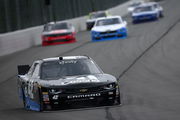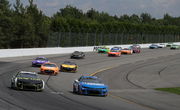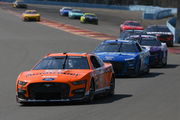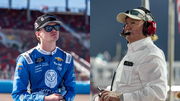
via Imago
Austin Dillon and Richard Childress | Image Credits: Imago

via Imago
Austin Dillon and Richard Childress | Image Credits: Imago
NASCAR penalizing Austin Dillon grabbed the headlines last week. While Richard Childress and his team appealed the punishment, the appeals panel upheld it. Safe to say, NASCAR was under a spot after having missed out on penalizing Dillon immediately after the win at Richmond. However, the decision to punish the #3 driver worked out fine.
Questions were raised left, right, and center after Dillon wrecked Joey Logano and Denny Hamlin yet won the race at Richmond. While NASCAR took its own time to give the final verdict, eventually the RCR driver lost his playoff spot despite the win. That said, the governing body’s President Steve Phelps explained the thought process behind the punishment.
ADVERTISEMENT
Article continues below this ad
Steve Phelps gets candid about the $25,000 penalty involving Austin Dillon and Richard Childress
After Austin Dillon won the race at Richmond, the backlash from the fans and community was highly intense. From drivers to team owners, NASCAR’s decision-making was condemned more than Dillon’s act. As the pressure grew, the verdict came out three days after the incident, a timeline uncommon with the ruling body.
While it explained the case’s complexity, it only added more mystery to the drama. At one end, Dillon rejoiced about his win and playoff berth, his colleagues were inching to know how NASCAR would react. Eventually, it penalized Richard Childress’ grandson docking 25 points from the drivers’ and owners’ standings.
Elton Sawyer, the NASCAR senior vice president of competition, explained how the verdict came into play. As per NASCAR.com, he said, “I think in all due respect to the appeal process, we looked at this and the totality of everything that happened as you enter Turn 3 and as the cars got to the start/finish line. So, as we look through all of that data, we came to the conclusion that a line had been crossed. Our sport has been based going for many, many years, forever, on good, hard racing. Contact has been acceptable. We felt like, in this case, that the line was crossed.”
NASCAR’s Elton Sawyer on why NASCAR allowed Austin DIllon to keep the Richmond win while deciding to revoke his automatic playoff berth. pic.twitter.com/AkknDGELmR
— Bob Pockrass (@bobpockrass) August 14, 2024
What’s your perspective on:
Is NASCAR becoming too soft, or is safety the top priority after the Dillon-Childress incident?
Have an interesting take?
While many resonated with what Sawyer said, NASCAR President Steve Phelps spoke about it more candidly. Speaking on ‘Kevin Harvick’s Happy Hours,’ Phelps added more detail to what Sawyer already stated. He said, “I’ll take it one step further. If we hadn’t penalized it, then I think over the next 12 weeks would look significantly different.”
It remains unknown how Denny Hamlin and Joey Logano would have taken it had NASCAR not taken the playoff berth off Dillon. Not only them but it just sent the wrong signal to any playoff-aspiring driver to cross that line for a place in the Round of 16. While being competitive has always been appreciated, it always should be within the limits and the integrity of the sport.
INSANITY ON THE FINAL LAP AT RICHMOND.
AUSTIN DILLON WINS AFTER CRASHING JOEY LOGANO AND DENNY HAMLIN. #NASCAR pic.twitter.com/mpQKcK236J
— NASCAR on NBC (@NASCARonNBC) August 12, 2024
Phelps added, “We just can’t have it. It really comes down to what you want your sport to be. That’s why I think we ruled the way we did; We’re not Demolition Derby. If we had done nothing I think it would have opened ourselves up for a mess honestly.” Most certainly, many other drivers would have dared to attempt what Dillon did, and who knows how the consequences would have been then.
Nevertheless, NASCAR made a well-thought-out decision. Even though not much harm was done to Dillon and Richard Childress, it certainly alerted drivers of the repercussions of any wrongdoings on the track. While Richard Childress has already filed another appeal to the Final Appeals Officer, Steve Phelps explained what could happen.
Trending
Steve Phelps warns NASCAR drivers how it is difficult to hide from the data following Austin Dillon’s Richmond penalty
It is amazing how Steve Phelps suggested that NASCAR never prefers to punish drivers unless necessary. A sport designed to be free-flowing will lose its charm with such rulings. However, he explained how safety is of primary importance above everything. On the same podcast, Phelps said, “And when you have a situation like that [Austin Dillon wrecking] it’s not safe.”
ADVERTISEMENT
Article continues below this ad
He further explained how Dillon got more in trouble because of how he wrecked Denny Hamlin rather than Joey Logano. He said, “I think the bump-and-run or slam-and-run or whatever it was (on Joey Logano), right, I won’t suggest that there wouldn’t have been a penalty, I have no idea. Because you had a second move, and the second move was a hook, in our opinion, which was both the eye test as well as the data would suggest that’s what happened.”
Phelps then sent a subtle warning to the Cup Series teams and drivers. He said, “It’s hard to hide from the data.” While he reiterated that a line had been crossed, he explained how Richard Childress’ other appeal to fight their case could turn out. Phelps added, “So they [RCR] will have the ability to appeal it and they will.

via Getty
HOMESTEAD, FL – NOVEMBER 18: NASCAR President Steve Phelps speaks to the media prior to the Monster Energy NASCAR Cup Series Ford EcoBoost 400 at Homestead-Miami Speedway on November 18, 2018 in Homestead, Florida. (Photo by Jared C. Tilton/Getty Images)
“I don’t know what’s going to happen there, but again, it is a decision that ultimately is; a recommendation is made by the competition group, and then it goes up to senior management. And if we don’t believe that they’ve got it wrong, like significantly wrong, we will not overturn their decision. It is their decision. They are the experts in this space”
ADVERTISEMENT
Article continues below this ad
Most certainly, the odds of the penalty being overturned are slim. It is nice how Steve Phelps came publicly to detail NASCAR’s intent and impose authority on the proceedings. Hopefully, this should discourage drivers from attempting such acts and provide a free-flowing and fair watch.
ADVERTISEMENT
ADVERTISEMENT
ADVERTISEMENT
ADVERTISEMENT







Is NASCAR becoming too soft, or is safety the top priority after the Dillon-Childress incident?